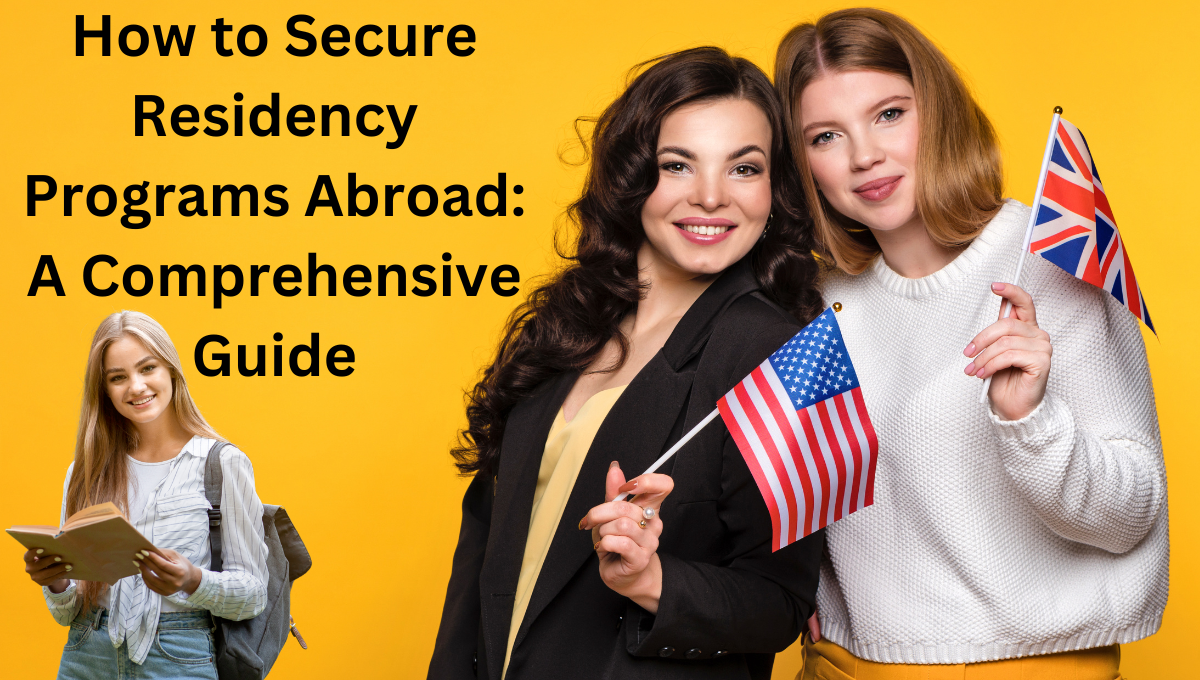How to Secure Residency Programs Abroad: A Comprehensive Guide
For medical professionals looking to further their careers, landing a residency program overseas is a transformative experience. The procedure might be intimidating and calls for careful preparation, commitment, and a thorough comprehension of every stage. This thorough manual provides a methodical way to assist you in obtaining a residency program in the nation of your choice.
Step 1: Programs for Research Residency Determine Your Destination Country in Detail
Choose the nation that best suits your career and personal objectives first. Understanding the specific residence requirements of each nation is essential. For instance:
The USMLE (United States Medical Licensing Examination) is necessary in the US.
The Professional and Linguistic Assessments Board, or PLAB, exam is necessary in the United Kingdom.
The Medical Council of Canada Qualifying Examination, or MCCQE, is required in Canada.
Recognize the Program’s Needs
Eligibility requirements for residency programs frequently vary, and these include:
accreditation of medical schools.
clinical experience or an internship.
assessments of language skills (such as the TOEFL or IELTS).
Determine Specializations
Select your specialty, such as pediatrics, surgery, or internal medicine. programs for research that are well-known in the topic you have selected.
Step 2: Complete the necessary coursework and licensing
Finish medical school
Make sure the nation where you are going will accept your medical degree. Certain nations could mandate that your school be included in directories such as the World Directory of Medical Schools.
Pass the licensing tests.
Get well-prepared for the license tests that apply to the nation where you plan to go. Make use of study materials, online classes, and practice exams. Important tests consist of:
for the United States, USMLE.
United Kingdom PLAB.
Australia’s AMC.
Become Certified in English Proficiency
Achieving a good score on tests like the TOEFL or IELTS is essential if English is not your first language.
Step 3: Acquire Useful Clinical Knowledge
Participate in clinical rotations.
In your chosen nation, clinical rotations can help you get practical experience, boost your self-esteem, and improve your application.
Make an application for an externship or observership.
International medical graduates’ (IMGs’) exposure to foreign healthcare systems is greatly aided by these programs.
Safe, robust recommendation letters
Collaborate with mentors during your clinical rotations to secure strong reference letters that emphasize your abilities, commitment, and residency fit.
Create an Outstanding Curriculum Vitae (CV) in Step Four.
Emphasize Your Academic Accomplishments
Provide information about your medical degree, license examination results, and any accolades you may have earned.
Add Publications and Research
Showcase any research initiatives or publications you’ve contributed to to demonstrate your dedication to evidence-based practice.
Highlight Your Extracurricular Activities
To demonstrate your versatility, highlight your volunteer work, leadership positions, and participation in medical organizations.
Step 5: Craft a Personal Statement That Stands Out
You can use a strong personal statement to highlight your qualifications for a residency program. Pay attention to:
What inspired you to seek the specialty?
experiences that have equipped you for living in a community.
long-term professional objectives and how the program fits into them.
To leave a lasting impression, use language that is genuine, succinct, and straightforward.
Navigating the Application Process in Step Six
Make Use of the Proper Application Platform
Certain platforms are used by various nations for applications for residency:
The United States’ Electronic Residency Application Service, or ERAS.
Oriel on behalf of the UK.
Canada’s CaRMS (Canadian Resident Matching Service).
Send in all necessary paperwork.
Include the following to make sure your application is complete:
academic transcripts that have been verified.
licensing test results.
referral letters.
Statement of own opinion.
Fulfill deadlines
Applications for residency are extremely time-sensitive. To make sure you don’t miss any deadlines, make a timeline.
Step 7: Succeed in Interviews for Residency
Be well-prepared.
Look for typical interview questions for programs that need residency. Prepare to talk about:
Your experiences in the clinic.
difficulties you’ve encountered and how you resolved them.
Your enthusiasm for the program and your planned contributions.
Practice Practice Interviews
To boost your confidence and sharpen your communication abilities, practice interviews with peers or mentors.
Show Your Professionalism
During the interview, present yourself properly, be on time, and demonstrate your excitement for the program.
Step 8: Get a Relocation Plan and a Visa
Apply for the Right Visa Find out what the country you are visiting has to offer in terms of visa requirements. For instance:
Visas for the United States are J-1 or H-1B.
The UK requires a Tier 2 visa.
Canada Temporary Resident Visa.
Make a Relocation Plan
Make plans for accommodation, transport, and acclimatization to your new surroundings after being accepted into a program.
Step 9: Get Ready for the Changeover
Recognize the Healthcare System
Learn about the procedures, technologies, and medical practices in the nation where you are staying.
Participate in orientation sessions
Orientation classes are provided by many residency programs to assist new residents in acclimating to their roles and responsibilities.
Step 10: Remain Dedicated and Resilient
It can be difficult to obtain residency overseas, but perseverance is rewarded. Keep your focus on your objectives, ask mentors for advice, and learn from any setbacks.
It takes commitment, careful preparation, and a thorough comprehension of every stage of the procedure to land a residency program overseas. You can put yourself in a successful situation and take a look at the following
FAQs by following this guide: Safeguarding Foreign Residency Programs
- What is a program for medical residents?
Under the guidance of certified professionals, medical graduates can obtain practical clinical experience in their chosen specialty through a postgraduate training program called a medical residency. - In which nations are international residency programs most popular?
Because of their sophisticated healthcare systems and wide range of clinical options, the United States, Canada, the United Kingdom, Australia, and Germany are among the most sought-after nations for residency programs. - What qualifications are necessary to be eligible for programs that offer international residency?
Typical eligibility requirements are as follows:
a medical degree that is accepted.
passing the appropriate license tests, such as the MCCQE, PLAB, and USMLE.
proficiency in the English language (e.g., IELTS or TOEFL).
internships or clinical experience.
- How can I pick the best residency course?
Think about things like:
Your favorite area of expertise.
Program accreditation and repute.
geographical location and preferred way of life.
Research opportunities and mentorship are available.
- What tests must I pass in order to be eligible for foreign residency?
Exam requirements differ by nation:
USMLE (Steps 1, 2, CK, and 3) in the United States.
PLAB, United Kingdom (Parts 1 and 2).
MCCQE (Parts I and II), Canada.
Australia: Medical Council (AMC) examinations.
- In my target nation, how may I obtain clinical experience?
In your preferred nation, you can apply for clinical rotations, externships, and observerships in hospitals or medical facilities. - What paperwork is needed to apply for residency?
Documents that are frequently needed include:
transcripts of academic work.
results of licensing exams.
referral letters.
Statement of own opinion.
CV stands for curriculum vitae.
Evidence of fluency in English.
- How can I craft a compelling personal statement for applications for residency?
Pay attention to:
The reason for your specialized choice.
experiences that were pertinent and helped you become ready for residency.
Your professional objectives and how the program fits within them.
- On which platforms are applications for residency submitted?
Usually, applications for residency are made via channels unique to each nation, like:
United States ERAS.
CaRMS (Canada).
United Kingdom: Oriel.
- How can I be ready for an interview for a residency?
Do extensive research on the program.
Practice responding to frequently asked questions regarding your clinical experiences, difficulties, and objectives.
To boost your confidence and communication abilities, practice interviews. - What kind of visa is needed to practice medicine overseas?
Countries have different requirements for visas:
Visa for the United States: J-1 or H-1B.
Tier 2 visa for the United Kingdom.
Canada: Work permit or temporary resident visa.
- How much time does it take to apply for residency?
Depending on the nation and program, the timetable often lasts several months and includes the submission of applications, interviews, and match results. - What is the match procedure for applying for residency?
In nations like the US and Canada, a mechanism called The Match matches applicants with residency programs according to shared preferences. - Can I submit applications to more than one residency program at once?
To improve your chances of getting accepted, you can apply to more than one program at once. But customize each application for the particular program. - Do residency programs offer financial help or scholarships?
Certain nations or organizations provide financial aid or scholarships. Look at opportunities in the country you want to visit and ask programs directly. - What typical difficulties arise throughout the procedure?
Among the difficulties are:
passing licensing tests that are competitive.
adjusting to various medical systems.
managing the logistics of relocating and obtaining visas.
- What steps can I take to increase my chances of getting accepted into a residency program?
Keep up good academic standing.
Get experience in a relevant clinical setting.
Obtain strong recommendation letters.
Create a compelling personal statement and resume.
Do well in the interview. - Does applying for a residency require any prior research experience?
Research experience is not always required, but it can improve your application, particularly for academic medical facilities or competitive programs. - Is it possible for international medical graduates (IMGs) to reside overseas?
Yes, IMGs are welcomed in many nations. They might have to fulfill extra conditions, though, like being certified by the US Educational Commission for Foreign Medical Graduates (ECFMG). - How can I remain informed about requirements and deadlines for residence applications?
Check for updates on a regular basis on the official websites of residency platforms (such as ERAS, Oriel, and CaRMS) and program-specific pages.

